Today we review the various viewpoints on Amazon’s announced acquisition of One Medical (ONEM, aka 1life Healthcare) which has been a huge story in both health care trade publications, business news, and mainstream media outlets.
Welcome to Day 2 of The Retail Health Battle Royale in the U.S., my week-long update of the American retail health/care ecosystem weaving the latest updates from the market and implications and import for health care consumers.
The deal was announced on 21 July, with Amazon striking the price at about $3.9 billion. Goldman Sachs and Morgan Stanley put the deal together, with Morgan having led ONEM’s acquisition of Iora Health last year. Iora Health has focused on the Medicare-enrolled population, distinct from ONEM’s target patient market of younger, employed consumers.
The $3.9 billion investment makes ONEM the third largest acquisition in Amazon’s portfolio, following Whole Foods at $13.7 bn and MGM Studios for $8.5 billion.
The PillPack (pharmacy) buy was $1 billion. With PillPack, I wrote here in June 2018 that Amazon got 50 U.S. State pharmacy licenses with the deal. With the ONEM acquisition, Amazon inherits 188 physician practices in 25 metropolitan markets, plus corporate/employer clients through One Medical for Business such as Airbnb, Google, Instacart, John Hancock, Lyft, Pinterest, SoulCycle and Zendesk, among many others.
As we all grapple with what this means at this preliminary stage and then what could evolve over time, I focus on the dual aspect of the opportunity: is this about primary care or is this about data?
To be sure, it’s both. For the former, Amazon leadership is talking up the company’s expertise in consumer experience and delight, efficiency and engagement (which I addressed in yesterday’s Day 1 post). And it’s the data, the mash-up of clinical information and consumer-generated data, food and retail consumption and insights gathered via voice, among other sources, that can help to personalize care, anticipate and prevent emergencies and exacerbations of chronic conditions, and support people in customized self-care outside of the doctor’s office or hospital.
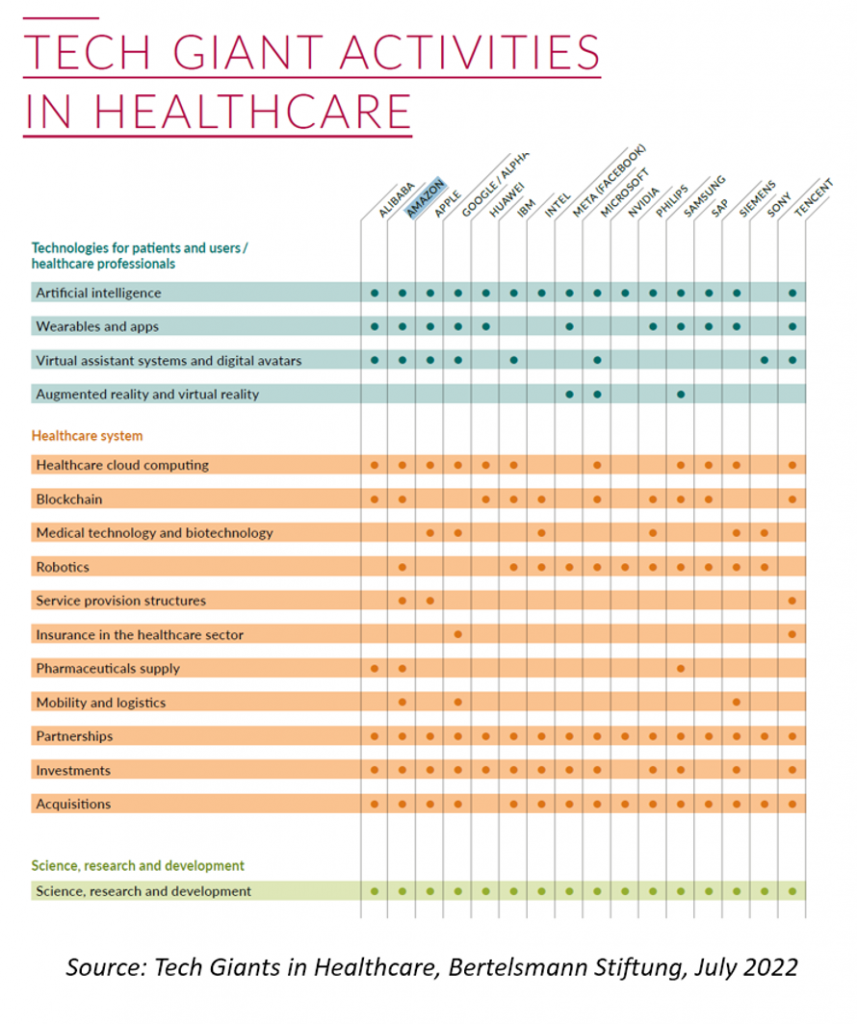
Amazon is already well-entrenched in many health care activities, as a new report from Bertelsmann Stiftung presented in this chart. We can see the Amazon column (second in alpha order following Alibaba) with more checkmarks (in dots) indicating the most health care activities by type compared with any other “tech giant” in the world. According to the team’s analysis, Amazon is not yet active in AR/VR, med-tech/biotech, or insurance (but see more on that below via Mike McSherry’s observations). This gives you a sense of Amazon’s current profile in the health/care ecosystem across many areas serving both providers and consumers.
Here are some thoughts I’ve curated from others’ views in mainstream press and health care trades to add into our understanding of this deal.
NPR’s Shauneen Miranda notes that Amazon has established a foothold in health care, with One Medical giving it more physical presence. Shauneen quotes Dr. Aaron Neinstein, VP of Digital Health at UC San Francisco: “Over the last few years, Amazon has been [similarly] trying to get into health care largely with digital interactions. I think this indicates their similar desire as Whole Foods to have a physical place where they can have a health care interaction with their patients or customers that’s available in most major American cities,” Dr. Neinstein added.
Mike McSherry CEO of Xealth told GeekWire he could see Amazon “bundling” a One Medical membership with a Prime subscription. This is an obvious convergence that many observers have mentioned given consumers’ growing embrace of subscriptions which grew during the pandemic.
Longer-term, Mike could envision Amazon expanding into health insurance. “It’s easier for them to continue to build up a benefit stack until at some point they said, ‘Hey, you’re already paying me $1,000 a year. Why don’t you just pay me $5,000 a year and I’ll be your insurance company,’” Mike conjectured.
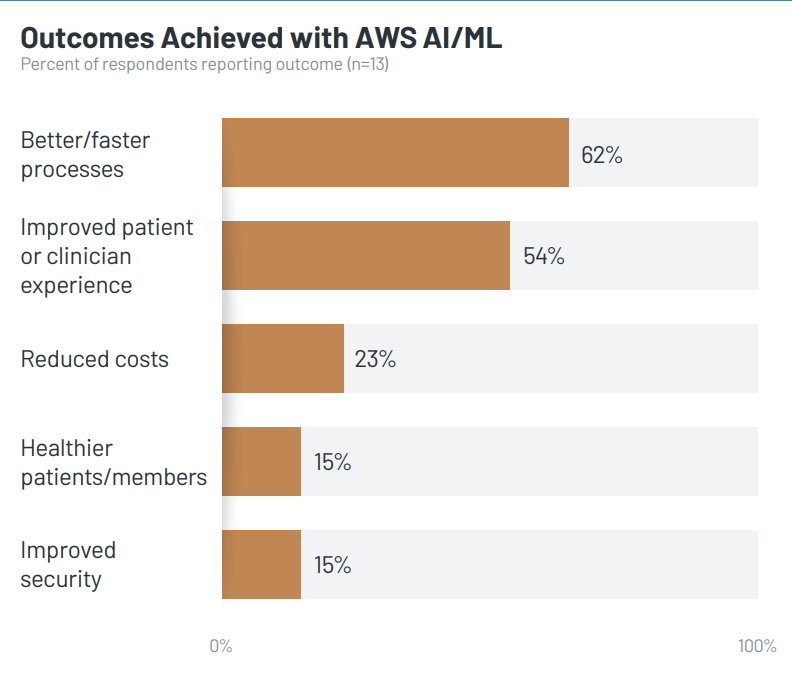
Another benefit an Amazon could bring to health care is to cut administrative costs through the company’s technology chops, as discussed by David Lazarus (“Laz”) of KTLA. “If Amazon’s data expertise can reduce that waste, this in theory can lower costs for patients,” Laz optimistically forecasted.
To do so, Amazon could/would leverage AWS, Amazon Web Services, the cloud business that health care industry stakeholders already use for data management. KLAS Research recently published research on AWS in health care, finding among 13 health care client users most had better/faster processes and improved patient or clinician experience. There are currently at least six AWS HIPAA-eligible AI/ML offerings, including Amazon Comprehend Medical, Amazon HealthLake, Amazon Lex, Amazon SageMaker, Amazon Textract, and Amazon Transcribe Medical — taken together, positioning AWS to compete with Microsoft and Google’s health clouds.
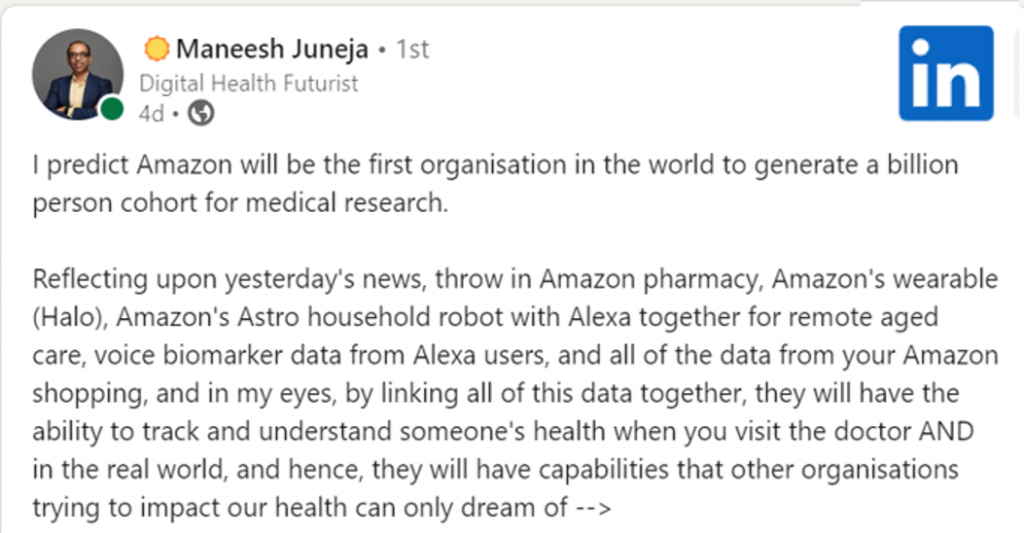
From my friend and colleague, digital health futurist Maneesh Juneja on his LinkedIn channel: Maneesh predicts that Amazon will be the first organization to convene a one-billion person cohort for medical research. He points to the dominance of voice assistant Alexa, the Astro household robot, and other consumer-generated data from Amazon’s ecosystem which can be mashed up with others’ (say, from wearable technologies like Fitbit or Withings, lab tests, etc.). “By linking all of this data together, they will have the ability to track and understand someone’s health when you visit the doctor AND in the real world,” Maneesh observes. “They will have the capabilities that other organizations trying to impact our health can only dream of.” Contrast Maneesh’s vision with the All of Us research program hosted by the NIH, seeking 1 million participants.
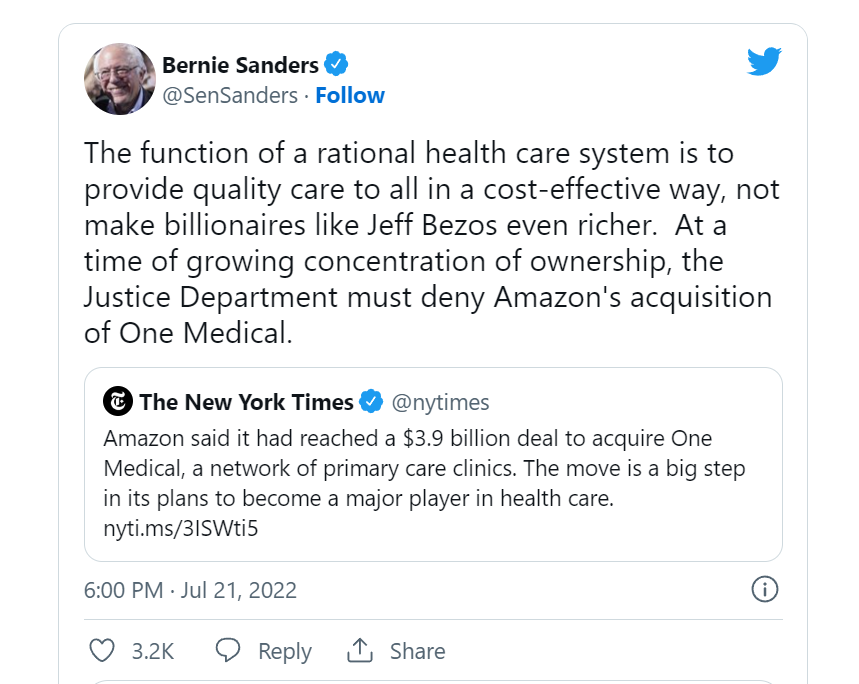
Consider one other aspect to consider in light of growing scrutiny of “Tech Giants” in health care (which I recently discussed in an essay for Medecision published on their Liberate Health blog portal). That is regulatory scrutiny on deals like this one, which Sen. Amy Klobuchar (D-MN) has in her sights.
Senator Klobuchar chairs the Senate Judiciary Subcommittee on Competition Policy, Antitrust, and Consumer Rights. In addition to potential anti-competitive threats caused by Amazon’s acquisition of at least 118 companies over 25 years, the Senator wrote in a letter to Chair Lina Khan of the Federal Trade Commission on July 21st, “I also ask that the FTC consider the role of data, including as a potential barrier to entry, given that this proposed deal could result in the accumulation of highly sensitive personal health data in the hands of an already data-intensive company.” I added the bold emphasis here on the issue of personal health data.
On Senator Klobuchar’s side of this argument, Senator Bernie Sanders (D-VT) tweeted this on the day of the deal announcement.
Some One Medical subscribers also expressed concerns about data privacy on Twitter, covered in this New York Post story published on 23rd July.
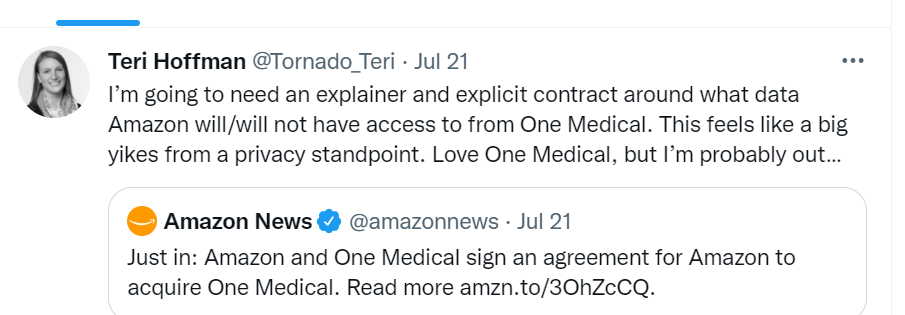
As one patient, @Tornado_Teri, tweeted, “I’m going to need an explainer and explicit contract around what data Amazon will/will not have access to from One Medical. This feels like a big yikes from a privacy standpoint. Love One Medical, but I’m probably out…”
As Mike McSherry from Xealth explained in the GeekWire analysis mentioned earlier, “Would I want Amazon to know that I have a cancer diagnosis? Probably not. Probably never. But would I be willing to share some information with them if I’m mildly obese and I’m interested in eating more healthfully? Sure. If I get a consumer benefit on that knowledge share.”
Health Populi’s Hot Points: If Amazon’s acquisition of One Medical clears regulatory barriers, the combination promises to pressure health care providers and stakeholders in the U.S. to further innovate for efficiency, data analysis, and consumer engagement and delight.
My friend and very wise fellow Gil Bashe, Managing Partner, Chair Global health with FINN Partners, expressed his own forecast this way:
“The health system will not be transformed by Amazon — but it will improve,” Gil wrote in Health Tech World UK.
“While success will not come easily or quickly, expect this e-commerce giant to continue to press forward with its headline-grabbing investments, learning until it gets it right. Improving our lot is not Amazon’s business objective, but we may benefit as an outcome.”
I think Gil has this just-right, so I’m sharing his thoughts with you.
Tomorrow on Day 3 of the Retail Health Battle Royale series, I’ll dive into the details of Apple’s publication on Empowering People to Live a Healthier Day, setting forth that tech giant’s vision for health care.
Never a dull moment right now in the retail health ecosystem!





 Thank you FeedSpot for
Thank you FeedSpot for